It’s Not Fair – Grace Series# 3, Divine Deliverance
It’s Not Fair – Grace Series# 3, Divine Deliverance
By: Bobby Sullivan
Recap: “It’s Not Fair – Grace”
Week #1 – Divine Detours. Following Jesus sees us walking towards things we would rather avoid and into situations we don’t understand.
Week #2 – Divine Interruptions. God’s mercy interrupts our religion and what we think should and shouldn’t happen. e.g the labourers in the vineyard.
Week #3 – Divine Paradoxes. Life and circumstance seem to contradict the promises of God and his word. Happens all the time!
2 Corinthians 12:8-10
“…My grace is sufficient for you, for My strength is made perfect in weakness.” …For when I am weak, then I am strong.”
How much performance religion is built upon trying to get stronger and eliminate weakness? How much emotional energy do we spend on trying to be strong, stronger, and avoiding weakness, when Paul learned to:
2 Corinthians 12:9
“…boast in my infirmities, that the power of Christ may rest upon me.”
Intro:
“Grace – It’s not fair.” Sometimes there are things in life we go through that aren’t fair, that hurt, that are difficult, and the “it’s not fair” comes from a deep spot of pain and frustration, often when we find ourselves in tight spots and difficulty.
Divine Deliverance:
Hard for us to hear, but life can be tough and unfair. Some people believe that if everything does not come easy, gift wrapped and perfectly matching everyone else’s experience, they have been treated unfairly.
Sometimes confusingly, we who believe in the power of God can sometimes get sideswiped by difficulty, believing our faith exempts us from it, and we end up saying, “but it’s not fair!”
Acts 14:21-22 PAUL comes back from a missions trip
21 “And when they had preached the gospel to that city and made many disciples, they returned to Lystra, Iconium, and Antioch,
- 22 strengthening the souls of the disciples, exhorting them to continue in the faith, and saying,“We must through many tribulations enter the kingdom of God.”
The Greek word for must is dei – (pronounced die).”necessary, inevitable, or required.”
The context begins at verse 19: “And having stoned Paul at Lystra, they dragged Him out of the city, supposing he had been dead” [Acts 14:19], and they dumped him somewhere outside of the city limits. “But as his disciples stood round about him, he rose up, and returned into the city” [Acts 14:20]. And as he came again to Lystra, “confirming the souls of the disciples, exhorting them to continue in the faith” [Acts 14:21-22], and this is the text, “And that we must through much tribulation enter into the kingdom of God” [Acts 14:22]. Our word tribulation used here in the text comes from the Latin Vulgate. A tribulum was an instrument that a farmer used to flail the wheat when he beat the wheat. It was a tribulum, so our word through the Latin, “tribulation,” a flailing, an affliction, a pressure, “that we must through much tribulation enter into the kingdom of God” [Acts 14:22].
Thlípsis – properly, pressure (what constricts or rubs together), used of a narrow place that “hems someone in”; tribulation, especially internal pressure that causes someone to feel confined (restricted, “without options”). 2347 /Thlípsis (“compression, tribulation”) carries the challenge of coping with the internal pressure of a tribulation, especially when feeling there is “no way of escape” (“hemmed in”).
Do you feel hemmed in? There is no way of escape? Powerless? At the mercy of situations, circumstances, higher powers, social pressures and constructs, personal limitations or resource scarcity that has you stuck… you can’t move even if wanted to? The pressure you feel is tribulation.
When you are complete in Christ and you rub up against someone in a broken and incomplete world, that contact will cause friction.
W.A. Criswell wrote in his sermon series: “How does the world face the inevitable? It is inescapable. First of all, how does the world face it? They live out there in the same planet that we live on, and the same age, and the same sorrows, and the same illnesses, and the same frustrations that assail us assail them. And they have to answer. They have to face it too. How do they do it? This is the way the world faces it. They do it in hopelessness and in despair. There’s no other way. They have no other choice. There is no alternative for them.
Let us take some of the most brilliant of minds of all time, such as Jean Paul Richter, a great German philosopher and skeptic. Now you listen to him as he writes, “I have traversed the world. I have risen to the sun, I have pressed athwart the great waste places of the sky; I have descended to the place where the very shadow cast by being dies out and ends . . . We are orphans, you and I. Every soul in this vast corpse-trench of the universe is utterly alone” just the inevitable death and nonexistence.”
I remember Pascal, the great scientist, saying, “The silence of the universe frightens me.” Disraeli, the architect of the great British Empire under Queen Victoria said, “Youth is a blunder. Manhood is a struggle. And old age is a regret.”
Leo Tolstoy wrote this in My Confessions and My Religion: he summarized the four attitudes that men take toward life’s problems. He made all of life under four classifications. Number one: Tolstoy said, “There are those who view life as all bad and get drunk to forget it.” There’s a second classification: he says, “Those who view life as all bad and struggle against it.” There’s a third classification, “Those who view life as all bad, and by suicide remove themselves from it.” And there’s a fourth one: and Tolstoy says he includes himself in this one. “There are those who view life as all bad but who live on, irrationally accepting it as it comes.” Did you ever think or see such absolute negation and despair as this incomparable novelist and philosopher to look at all of life and make it into those tragic four categories?
Now the purpose of the sermon this morning is there is something more to it than that. We do have our sorrows, all of us. We have our heartaches, all of us. We have our vales and our valleys, all of us. We have our tears that fall sometimes like rain. All of us know the inevitability of life. The day is coming. Age is coming. Death is coming; the break-up of our homes and of our families. All of us experience these inevitabilities.
But there is another alternative. If I could add it to Tolstoy—a fifth one, and that is this: there is also the possibility that there could be purpose and God in the troubles, and the trials, and the tribulations that we suffer.
Beudro and Thibodeau one time were standing before the busts of two men. One was the bust of the German poet, Goethe. And the other was the bust of the Italian poet, Dante. And Beudro turned to Thibodeau and said, as he looked at the two busts, he said, “What is it in the face of Dante that is missing in the face of Goethe?” And immediately Thibodeau responded, “God.”
We don’t enter the kingdom by what we suffer, but by what Jesus suffered, that’s why he is encouraging them to keep the faith.
But, if we are to manifest and enter into the experienced reality of kingdom living in a fallen world, we will bump up against tribulation and difficulty.
John 16:33
“These things I have spoken to you, that in Me you may have peace. In the world you will have tribulation; but be of good cheer, I have overcome the world.”
Biblical Illustration of being hemmed in, having no way of escape.:
Exodus 14:1-3
“…Speak to the children of Israel, that they turn and camp before Pi Hahiroth, between Migdol and the sea, opposite Baal Zephon; you shall camp before it by the sea. 3 For Pharaoh will say of the children of Israel, ‘They are bewildered by the land; the wilderness has closed them in.’
I might have questioned God’s strategic planning abilities here.
Exodus 14:10-12
And when Pharaoh drew near, the children of Israel lifted their eyes, and behold, the Egyptians marched after them. So they were very afraid, and the children of Israel cried out to the Lord. 11 Then they said to Moses, “Because there were no graves in Egypt, have you taken us away to die in the wilderness…? it would have been better for us to serve the Egyptians than that we should die in the wilderness.”
That is tribulation. To be confined, restricted, to have no options, and to feel the internal pressure of it.
Exodus 14:13-14
And Moses said to the people, “Do not be afraid. Stand still, and see the salvation of the Lord, which He will accomplish for you today. For the Egyptians whom you see today, you shall see again no more forever. 14 The Lord will fight for you, and you shall hold your peace.”
Same as Jesus, who told us about tribulation so we would have peace, and who encouraged our hearts with the assurance that he has overcome the world.
In the midst of whatever is causing you to say “It’s not fair,” Grace is our hope.
HOPE is:
H – Healthy O – Opportunistic P – Practical E – Experience
H – Healthy. Hope is healthy.
Proverbs 13:12
“Hope deferred makes the heart sick, but a longing fulfilled is a tree of life.”
If you don’t believe in God’s grace and deliverance, you will get discouraged, frustrated, and the internal pressure and pain of the cry “it’s not fair,” will bring you down and debilitate, discourage you and distract you from the bigger picture. The bigger picture is the portrait of Jesus that the devil doesn’t want you to see. Why? Because that’s what you are supposed to see in the mirror.
Rom. 15:13
“May the God of hope fill you with all joy and peace as you trust in him, so that you may overflow with hope by the power of the Holy Spirit.”
Exodus 15:22-27. Moses, Miriam, and the Israelites have finished singing, and now it is time to journey on. Moses leads the Israelites into the desert and they go for three days without finding water. Finally they came to some water but the water was bitter It was undrinkable. The Israelites named the place “Marah”, which means “bitterness.”
When the Israelites came to this bitter water they did what you and I would do: they grumbled against their leader Moses. Moses in turn cried out to God. God showed Moses a piece of wood which Moses promptly threw into the water. Immediately the water was made sweet and the Israelites were able to drink it. Moses then led them to a place called Elim which had twelve springs and seventy palm trees.
Whatever the bitter obstacles that we encounter in life’s journey we can count on God to transform them, to use/redeem them for good, as God leads us to our personal Elim. When we cry our Marahs (bitterness) out to God, God is able to “sweeten” them, that is, to make them drinkable, to turn them into a resource for the next leg of the journey. Our English translations have difficulty in translating the verb for Yahweh “showing” or “directing” Moses to a tree/piece of wood. The verb used actually means to instruct or teach. Yahweh instructed/taught Moses a tree. That does not make much sense, but it is important to note because this verb is the root verb of the word “Torah”. Torah means instruction, and it specifically refers to the instruction that God gave Moses on Mount Sinai for how the Israelites were to live in covenant with this God who brought them up out of Egypt. We might say that Yahweh “torah-ed” Moses a tree.
When Moses cast this torah tree into the bitter water, the water became sweet. Torah is not for water, however, but for people. The bitter waters of Marah revealed the bitterness that lodged in the hearts of the Israelites. Notice that they grumbled against Moses while Moses cried out to Yahweh. The external obstacle revealed the internal realities of their hearts. Moses trusted God and cried the problem out. The Israelites, on the other hand, betray a lack of trust as they grumble among themselves against Moses.
What becomes evident in the face of Marah is that the Israelites needed deliverance from more than just Pharaoh. They needed deliverance from their grumbling, mumbling, bitter selves. And God is set to bring about that deliverance. This begins the transformation from bitterness to sweetness. O taste and see that the LORD IS GOOD
Right then and there, after Moses/Yahweh sweetened the water with the tree, Yahweh “made a decree and a law for them, and there He tested them. He said, ‘If you listen carefully to the voice of your God and do what is right in His eyes, if you pay attention to His commands and keep all His decrees, I will not bring on you any of the diseases I brought on the Egyptians, for I am Yahweh your Healer.'” This text makes it plain that the emphasis is on the transformation of the Israelites rather than the water of Marah. In a word, Israel is to be “God-centered” in all their living. Remember, down in Egypt life had been Pharaoh centered.
So God “tested” the Israelites there at Marah. This testing was for the purpose of training them, to reveal their hearts in order that their hearts might be changed where needed. The test revealed that Moses was God centered and that Israel was not. The test was a training exercise for Israel, designed to bend their bitter, grumbling hearts toward the Father.
It turned a cancerous acquaintance into a trusted/healthy relationship
O – Opportunistic
Hope empowers you to see opportunity when others only see failure, dead-ends and chaos.
Exodus 14:4
Then I will harden Pharaoh’s heart, so that he will pursue them; and I will gain honor over Pharaoh and over all his army, that the Egyptians may know that I am the Lord.”
And they did so.
Paul was locked up in prison, but he saw in prison the opportunity to write. 7 books of the Bible were locked up ready to be released from the heart of a man in prison. This was the seed for eternal fruit for well over 2,000 years. Remember, “Sieze the opportunity of a lifetime during the lifetime of the opportunity.”
You say, “I’m not in prison” Well that’s not what I read from some facebook post! Take on the mentality of Paul! If you feel you’re in prison, write something, post something that will bring life! Something that someone will remember in future generations. Use your minutes wisely. I told Micah playing football, “Names will be forgotten, stats will be broken but legacies live forever.”
What will people remember you by? If your opinions are getting you blocked, unfollowed or unfriended, you have lost your testimony and your ability to influence.
2 Timothy 2:9-10
“And because I preach this Good News, I am suffering and have been chained like a criminal. But the word of God cannot be chained…”
That was confined space, a real lockdown, and from that spot he wrote possibly up to 7 books of the Bible. Hope sees opportunity!
P – Practical
Hope is practical, it is so much more than just sitting back and waiting and wishing for a solution. Hope inspires engagement. God promised the Israelites “stand still and you will see the salvation of your God, The Lord will fight for you.” He gives them a gracious promise, but then in the very next breath He says to Moses;
Exodus 14:15-16
“…“Why are you crying out to me..? In other words, “Why are you praying?”
When will we ever get it through our thick heads that If Christ is in you, then you have the answer?
Raise your staff and stretch out your hand over the sea to divide the water so that the Israelites can go through the sea on dry ground.”
The hope that the grace of God gives us empowers to act. We have been given authority, and we can take up what is in our hand with renewed passion.
Hope is a helping hand, a tear of understanding, hope is caring in this crisis. The practicality of hope is being a little jesus. W.W.J.D translates what will you and I do?
He would be building thousands of arks. He would not be standing on one corner of the ark telling people to squeeze into the crack of the door and see if you can work your way in. He would be harvesting souls. He loves you down to his last drop of blood, his last breath whispers, “today you will be with me in paradise”
The hope of God is going to fan into flame the gift of God in you. It will be a volcanic eruption that will shake the nation. Just like the lava moves and covers ground, the hope of God will transform the landscape around you. Seize, Conquer, take over, transfigure, convert, or even metamorphosis are the results from the Gospel of the Kingdom. All these words as militaristic as they sound are really words of hope for those convinced the Jesus is the answer to everything.
Hope for humanity comes from a burning desire to make a difference. From a conviction that I will not bow to the status quo and continuing doing church the same ritualistic archaic way. But from that conviction I am compelled to restore a vibrant, healthy relationship birthed from that hope that I can make a difference.
E – Experience
Our hope is real, tangible, rooted in the love of God , and has promise of real breakthrough in our experience.
Unlike 170 years ago Karl Marx said: “Religion is the sigh of the oppressed creature, the heart of a heartless world, and the soul of soulless conditions. It is the opium of the people”. He argues that religion plays a significant role in maintaining the status quo by promising rewards in the after-life rather than in this life.
I don’t need a promise in the after life when I need a promise to succeed, prosper and have an impact in this one. The truth is facts tell but stories sell. Your life is a living library of stories yet read. Many of you have an untold story that itching ears are waiting for.
Romans 5:1-5
Therefore, since we have been justified through faith, we have peace with God through our Lord Jesus Christ, 2 through whom we have gained access by faith into this grace in which we now stand. And we boast in the hope of the glory of God. 3 Not only so, but we also glory in our sufferings, because we know that suffering produces perseverance; 4 perseverance, character; and character, hope. 5 And hope does not put us to shame, because God’s love has been poured out into our hearts through the Holy Spirit, who has been given to us.
1 Corinthians 6:17 17 “But the one who joins himself to the Lord is mingled into one spirit with him.” Do you know what difficulties, trials, pressure and conflict does? It gives you the opportunity to manifest what’s on this inside. Its Christ in you! You will manifest what your possessed with! The Jesus in me is big enough to expose himself through me. The character that he is looking to mold me with is not to make me more disciplined and obedient but a character that is shaped and molded by hope!
Christ in us is the hope of glory for the Southshore! Think about that!
Hope does not disappoint in that while I “was” a sinner, he came and died for me! You are a new creation! Quit belittling and cheapening your salvation experience by calling yourself what you’re not. You have a new identity. You are a child of God! You are a saint not a sinner.
Psalm 34:19 “Many are the afflictions of the righteous but the Lord delivers him from them all.” Psalm 34:4 I sought the LORD, and He answered me; He delivered me from all my fears.
Psalm 34:6
This poor man called out, and the LORD heard him; He saved him from all his troubles.
Psalm 71:20
Though you have shown me many troubles and misfortunes, You will revive me once again. Even from the depths of the earth You will bring me back up.
Psalms 27:13 David said
“I would have lost heart, unless I had believed That I would see the goodness of the Lord In the land of the living.” In this day, in this world, in this life not just the afterlife. I want this city to see it! I want my co workers to see it.
Don’t lose heart, don’t lose hope! Hope is healthy, opportunistic, practical, and will lead to a new experience.
Rom. 15:13
“May the God of hope fill you with all joy and peace as you trust in him, so that you may overflow with hope by the power of the Holy Spirit.”
Grace — it’s not fair – Sometimes life is not fair, but neither is the grace of God by which we experience Divine Deliverance. Amen!


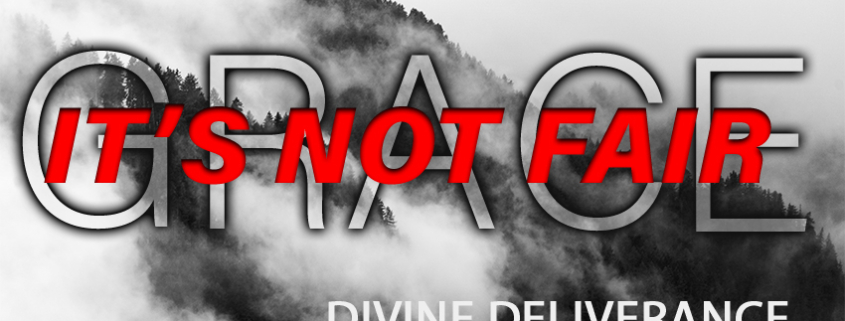
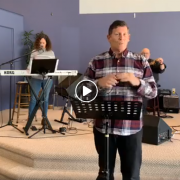
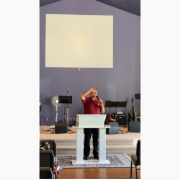

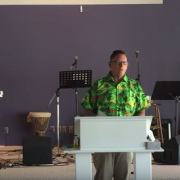
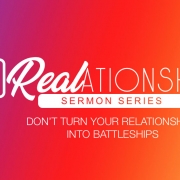



Leave a Reply
Want to join the discussion?Feel free to contribute!